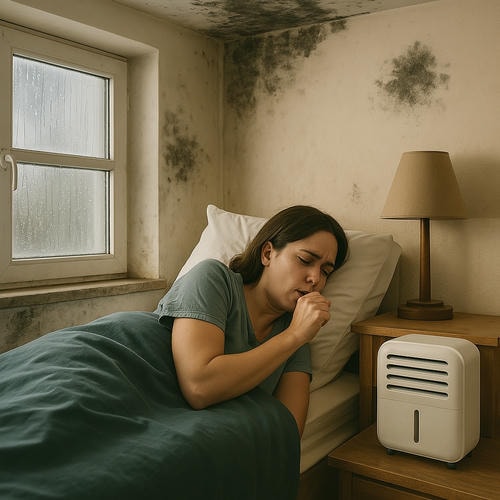Mold is a common problem in many homes, especially in damp or poorly ventilated areas. But is it safe to sleep in a room with mold? The short answer is no—mold can cause health issues, especially if you are exposed to it for long periods while sleeping.
How Mold Affects Your Health
Mold releases tiny spores into the air, which can be harmful when inhaled. Some common health effects include:
- Allergic reactions – Sneezing, runny nose, itchy eyes, and skin irritation.
- Respiratory problems – Coughing, wheezing, and difficulty breathing, especially for people with asthma.
- Fatigue and headaches – Long-term exposure can lead to tiredness and brain fog.
- Worsened immune system – Mold exposure can weaken your body’s ability to fight infections.
People with allergies, asthma, or weakened immune systems are at higher risk of experiencing severe symptoms.
Signs of Mold in Your Bedroom
Mold can grow in hidden places, so it’s important to recognize the signs:
- Musty smell – A damp, earthy odor is a strong indicator of mold.
- Visible spots – Black, green, or white patches on walls, ceilings, or furniture.
- Condensation – Excess moisture on windows or walls can encourage mold growth.
How to Remove Mold and Prevent It
If you find mold in your bedroom, take action immediately:
- Improve ventilation – Open windows regularly and use fans to keep air moving.
- Control humidity – Keep indoor humidity between 40–60% using a dehumidifier.
- Clean affected areas – Use vinegar or a mold-killing cleaner to remove mold.
- Fix leaks – Check for water leaks in walls, ceilings, or pipes.
- Replace damaged materials – If mold has deeply affected walls or carpets, consider replacing them.
Final Thoughts
Sleeping in a moldy room is not safe and can lead to serious health problems over time. If you suspect mold in your bedroom, take steps to remove it and improve air quality. A clean, dry, and well-ventilated space ensures better sleep and overall health.



